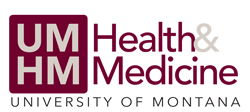- Editorial Offices
- 325 Brantly Hall
- Missoula, MT 59812
- (406) 243-2488
- themontanan@umontana.edu
- Icons By Maria Maldonado
 UM provides more health career programs than any other campus in the state, and to promote this fact and foster new advances in health education and research, the new UM Health & Medicine initiative recently launched.
UM provides more health career programs than any other campus in the state, and to promote this fact and foster new advances in health education and research, the new UM Health & Medicine initiative recently launched.
“We already offer incredibly robust programming in health and medicine areas, which lead to high-paying jobs in some of the hottest career fields,” UM President Royce Engstrom says. “UMHM gives us the structure to emphasize, strengthen, and grow these programs for the benefit of Montana and the region.”
The new organization will:
Montana will need 40 percent more health care workers in the next decade, according to UM’s Bureau of Business and Economic Research. This translates to an additional 7,000 workers by 2025 to care for Montana’s growing and aging population.
This is compelling news to Reed Humphrey, the UMHM initiative leader and dean of UM’s College of Health Professions and Biomedical Sciences. Forecasts such as this mean UM must become even more engaged in preparing health care professionals.
“There is an ever-widening gap between the health needs of Montanans and our ability to supply a workforce to meet those needs,” Humphrey says. “It struck me when I arrived on this campus years ago that we have a lot of really strong programs but lacked a common identity or entry point, mostly because programs grew up in different colleges on the campus. That made it difficult to understand how to navigate a career path in health professions. We needed to fix that, and UMHM is designed to do exactly that.”
He said the initiative will provide a framework for UM’s health and medicine programs, which are widespread across campus and include UM’s two-year Missoula College. UMHM will provide a portal for students interested in health careers. He also wants the organization to generate and support a “community of learners” among its students—a group that will synergize and enhance the learning process at UM.
Roberta Evans is another designer of the initiative and dean of UM’s Phyllis J. Washington College of Education and Human Sciences, where “human sciences” refer to a portfolio of physical and mental health programs that constitute nearly half the college. She said the UMHM effort is transdisciplinary and will train professionals in the teamwork component required by people now working in hospitals to treat the whole person.
“Currently, the many great academic health opportunities across UM appear like pieces of a jigsaw puzzle,” Evans says. “This program will bring the pieces together, clarify the options available, and also showcase our extraordinary successes. So I think this will unify our messaging, and the opportunities are going to just explode.”
More information about the initiative, which will be housed in UM’s Skaggs Building, is online at www.umt.edu/umhm.